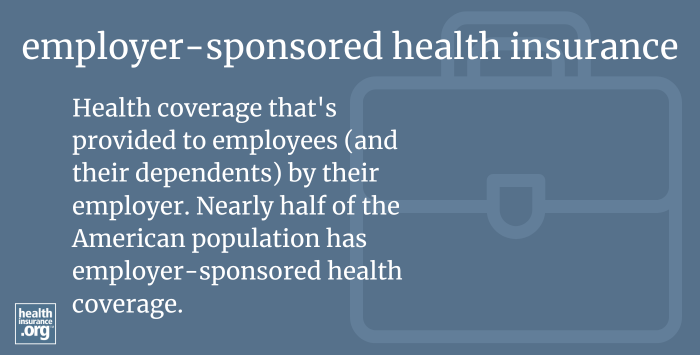
What is employer-sponsored health insurance?
Employer-sponsored health insurance is health coverage that's provided to employees (and their dependents) by their employer. Nearly half of the American population has employer-sponsored health coverage, and it's by far the most common type of coverage in the country.1
In 2023, the average employer-sponsored health plan had a total monthly premium of $703/month for a single employee and $1,997/month for family coverage. The average employer pays the majority of the cost, but employees do typically have to pay a portion of the premiums via payroll deduction.2
The Affordable Care Act, which was signed into law in 2010, includes an employer mandate, which applies to all businesses with at least 50 full-time equivalent employees. These businesses are required to offer affordable, minimum-value insurance to their full-time (30+ hours per week) workers or face a potential tax penalty.
Employers can purchase small-group coverage or large-group coverage, depending on how many employees they have (in most states, employer with 51 or more employees obtain coverage in the large group market).
Alternatively, employers can self-insure, which means that the employer pays employees' medical claims with their own money, rather than purchasing coverage from an insurance company (most self-insured plans contract with an insurance company to administer the coverage). Employers also have the option of offering an ICHRA, under which they reimburse employees for some or all of the cost of obtaining individual market coverage.
Group health plans, including small-group, large-group, and self-insured plans, must be guaranteed issue, meaning that the plan must cover all enrollees whose employment qualifies them for coverage. Under the ACA, employers cannot impose a waiting period of more than 90 days before new employees are eligible for their employer's health benefits,3 assuming they would otherwise meet the eligibility criteria (for example, working enough hours).
Employers often provide additional supplemental coverage in addition to a major medical plan, such as dental insurance, vision insurance, life insurance, and short- and long-term disability coverage.
Footnotes
- "Health Insurance Coverage of the Total Population" KFF.org. Accessed Oct. 3, 2024 ⤶
- ”Employer Health Benefits, 2023 Annual Survey” KFF. Oct. 18, 2023. ⤶
- "Affordable Care Act Implementation FAQs - Set 16" CMS.gov. Accessed Oct. 3, 2024 ⤶


